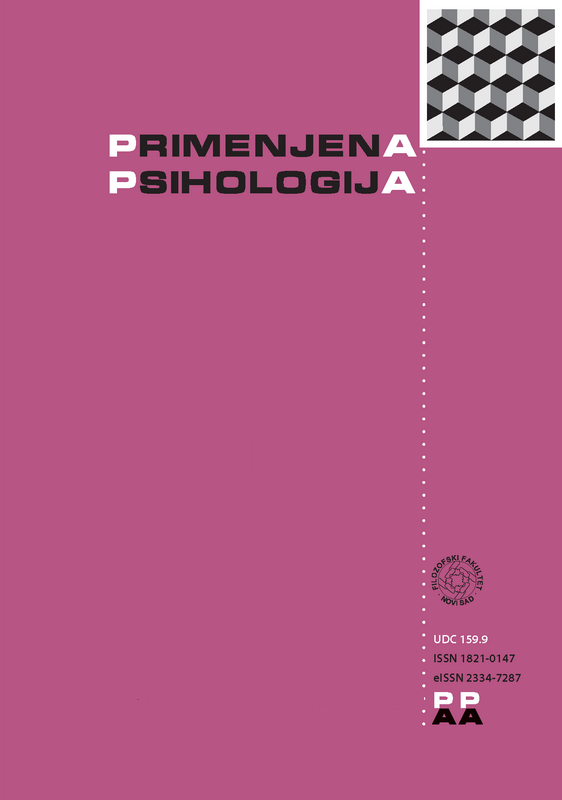OCCUPATIONAL STRESS AND MENTAL HEALTH IN THE POPULATION OF POLICE OFFICERS: META-ANALYTIC STUDY
DOI:
https://doi.org/10.19090/pp.2017.1.63-80Keywords:
police officers, occupational stress, mental health, meta-analysisAbstract
The aim of the present meta-analytic study was to quantitatively integrate findings from single studies investigating correlations between occupational stress and mental health within population of police officers. Included studies are quantitative correlational studies, published in English. Acceptable scientific sources were studies published in journals (excluding review papers) for the last 15 years. This meta-analysis included 10 papers with 10 studies and 4180 examinees from the population of police officers. Random-effects meta-analysis model was used. Average effect size, expressed by Pearson correlation coefficient, was .37 and it can be interpreted as moderate. Moderator effects of time when a study was published and the impact factor of the journal where a study was published were obtained, except that there was no significant interaction of these two moderators. The obtained average effect size should be considered as preliminary, due to certain study limitations.
References
Alexander, C. (1999). Police psychological burnout and trauma. In J. M. Violanti & D. Paton (Eds.), Police trauma: Psychological aftermath of civilian combat (pp. 54−64). Springfield, IL: Charles C. Thomas.
Anshel, M. H. (2000). A conceptual model and implications for coping with stressful events in police work. Criminal Justice and Behavior, 27(3), 375. doi:10.1177/0093854800027003006
*Aaron, J. D. K. (2000). Stress and coping in police officers. Police Quarterly, 3, 438–450. doi:10.1177/109861110000300405
Berry, L. M. (1998). Psychology at work: An introduction to industrial and organizational psychology (Rev. ed.). San Francisco, CA: McGraw Hill.
Burke, R. J. (1993). Work-family stress, conflict, coping, and burnout among police officers. Stress Medicine, 9, 171–180. doi:10.1002/smi.2460090308
Cohen, J. (1992). A power primer. Psychological bulletin, 112, 155–159. doi:10.1037/0033-2909.112.1.155
Collins, P. A., & Gibbs, A. C. C. (2003). Stress in police officers: A study of the origins, prevalence, and severity of stress-related symptoms within a county police force. Occupational Medicine, 53(4), 256–264. doi:10.1093/occmed/kqg061
Gershon, R., Lin, S., & Li, X. (2002). Work stress in aging police officers. Journal of Occupational and Environmental Medicine, 44(2), 160–167. doi:10.1097/00043764-200202000-00011
Huedo-Medina, T., Sanchez-Meca, J., Marin-Martinez, F., & Botella, J. (2006). Assessing heterogeneity in meta-analysis: Q statistic or I2 index? CHIP Documents. Paper 19. doi:10.1037/1082-989x.11.2.193
Hunter, J. E., & Schmidt, F. L. (2014). Methods of meta-analysis: Correcting error and bias in resarch findings. Newbury Park, CA: Sage. doi:10.4135/9781412985031
*Kohan, A., & Mazmanian, D. (2003). Police work, burnout, and pro-organizational behavior: A consideration of daily work experiences. Criminal Justice and Behavior, 30, 559–583. doi:10.1177/0093854803254432
*Liberman, A. M., Best, S. R., Metzler, T. J., Fagan, J. A., Weiss, D. S., & Marmar, C. R. (2002). Routine occupational stress and psychological distress in police. Policing: An International Journal of Police Strategies and Management, 25(2), 421–439. doi:10.1108/13639510210429446
Martinussen, M., Richardsen, A., & Burke, R. (2007). Job demands, job resources, and burnout among police officers. Journal of Criminal Justice, 35(3), 239–249. doi:10.1016/j.jcrimjus.2007.03.001
Maslach, C. (2003). Job burnout: New directions in research and intervention. Current Directions in Psychological Science, 12(5), 189–192. doi:10.1111/1467-8721.01258
*Mumford, E. A., Taylor, B. G., & Kubu, B. (2015). Law Enforcement Officer Safety and Wellness. Police Quarterly, 18(2), 111-133. doi:10.1177/1098611114559037
Paterson, G. T., Chung, I. W., & Swan, P. W. (2014). Stress management interventions for police officers. Journal of Experimental Criminology, 10, 487–513. doi:10.1007/s11292-014-9214-7
Paton, D., & Violanti, J. M. (1999). Trauma stress in policing: Issues for future consideration. In J. M. Violanti & D. Paton (Eds.), Police trauma: Psychological aftermath of civilian combat (pp. 293−297). Springfield, IL: Charles C. Thomas.
Penalba, V., McGuire, H., & Leite, J. R. (2009). Psychosocial interventions for prevention of psychosocial disorders in law enforcement officers. The Cochrane Library, 4. Retrieved from http://www.thecochranelibrary.com
*Pienaar, J., Rothmann, S., & Van de Vijver, F. J. R. (2007). Occupational stress, personality traits, coping strategies, and suicide ideation in the South African Police Service. Criminal Justice and Behavior, 34, 246–258. doi:10.1177/0093854806288708
*Pole, N., Kulkarni, M., Bernstein, A., & Kaufmann, G. (2006). Resilience in retired police officers. Traumatology, 12(3), 207–216. doi:10.1177/1534765606294993
*Russell, L. M. (2014). An empirical investigation of high-risk occupations. Management Research Review, 37(4), 367–384. doi:10.1108/MRR-10-2012-0227
Sánchez-Meca, J., & Marín-Martínez, F. (2010). Meta-analysis in psychological research. International Journal of Psychological Research, 3(1), 150–162.
Schaufeli, W., & Enzmann, D. (1998). The burnout companion to study and research: A critical analysis. London: Taylor and Francis.
*Stephens, C., & Pugmire, L. A. (2008). Daily organisational hassles and uplifts as determinants of psychological and physical health in a sample of New Zealand police. International Journal of Police Science & Management, 10(2), 179–191. doi:10.1350/ijps.2008.10.2.73
*Thompson, B. M., Kirk, A., & Brown, D. F. (2005). Work based support, emotional exhaustion, and spillover of work stress to the family environment: A study of policewomen. Stress and Health, 21, 199–207. doi:10.1002/smi.1056
*Tyagi, A., & Dhar, R. L. (2014). Factors affecting health of the police officials: Mediating role of job stress. Policing: An International Journal of Police Strategies & Management, 37, 649–664. doi:10.1108/PIJPSM-12-2013-0128
Violanti, J. M. (1997). Suicide and the police role: A psychosocial model. Policing: An International Journal of Police Strategies and Management, 20, 698–715. doi:10.1108/13639519710368107
Webster, J. H. (2012). A meta-analytic review of the correlates of perceived stress among police officers (Unpublished doctoral dissertation). University of Cincinnati.
Webster, J. H. (2013). Police officer perceptions of occupational stress: The state of the art. Policing: An International Journal of Police Strategies & Management, 36, 636–652. doi:10.1108/PIJPSM-03-2013-0021







